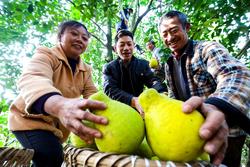 Farmers harvest pomelos in Linfeng town, Chongqing. (PHOTO PROVIDED TO CHINA DAILY)
Farmers harvest pomelos in Linfeng town, Chongqing. (PHOTO PROVIDED TO CHINA DAILY)
Sun Xiulan carefully tended to her pomelo orchard after last month's harvest in Linfeng town, Chongqing, thankful for the 200,000 yuan (US$31,000) it earned her family.
Farmers in the town, in the municipality's northeastern Changshou district, used to grow corn, sweet potato and potato-lao san tuo in the local dialect-but low incomes led many to move to cities for work. Now, more than 3,500 hectares of pomelo orchards are generating incomes comparable to those of many urban white-collar workers.
"Good. Good enough," said Sun, 58, when asked about life in Linfeng, adding that her family built a three-floor house in the center of the town a few years ago and has bought several apartments in Changshou.
Other local residents tell similar stories. With more than 80 percent of farmers guided by the government to plant pomelo in recent years, the town has cast off poverty and become a well-known pomelo-growing hub.
In late October, the annual Central Rural Work Conference called for more efforts to develop a new stage of rural development, including speeding up rural industrial development to bring farmers more benefits
Growing pomelo gives local farmers extra revenue of 30,000 yuan per household and brings the town output value of 320 million yuan.
In late October, the annual Central Rural Work Conference called for more efforts to develop a new stage of rural development, including speeding up rural industrial development to bring farmers more benefits.
ALSO READ: Targeted agriculture plays key role to tackle poverty in rural areas
"The round and yellow pomelo has become a fortune for us," said Zhou Jian, Linfeng's town chief. "Linfeng is expected to continue to take advantage of e-commerce and ride on the wave of agricultural tourism for more gains in the coming decade."
He said that the biggest hurdle in persuading farmers to plant pomelo was that many of the trees failed to bear fruit due to the farmers' inexperience.
"To tackle the problem, we invited agricultural technicians to open free courses to farmers, training them about techniques including pruning, pollinating, fertilization and insect control," Zhou said.
Despite the COVID-19 pandemic, the pomelo season in Linfeng ended on a particularly cheerful note last month, with more than 40,000 pomelos selling out across the country in just two weeks, a third of the time it usually took, he said.
Zhou attributed the success to e-commerce and the introduction of delivery companies to the town.
Last year, the Linfeng government invited over 10 delivery companies, including SF Express, China Post and YTO Express, to set up dozens of small delivery stations across the town.
"Farmers no longer need to take heavy baskets of pomelo to a delivery site far away in the town center," said Zhang Xingdong, deputy director of China Post's Linfeng branch.
"As we pick up huge amounts of pomelo, we are also able to lower the transportation cost."
China Post charges just 8 yuan to send a package of pomelo weighing 5 kilograms to any address in Chongqing, and 9 yuan to provinces including Henan, Shanxi and Jiangxi, he said.
Linfeng covers 55.8 square kilometers and governs 11 villages and communities, with a total population of 36,000.
The town is now scrambling to tap into agricultural tourism, which allows tourists to pick pomelos and enjoy the leisure of rural life.
The government has also cooperated with travel agencies to create a new model of "tree subscription", where tourists can name a pomelo tree and plant it.
More than 200 were planted that way last year.
"Compared with picking fruit directly, subscribers can participate in the growth of a fruit tree, which is even more interesting for urban tourists," Zhou said.
Besides pomelo, the town is encouraging local farmers to sell agricultural products including chickens, ducks, eggs and vegetables, which have gained popularity among tourists, he said.
Local government data show an average of 200,000 tourists visit the town each year, bringing in income of about 30 million yuan.
READ MORE: Factory, agriculture park help Lianzhang village farmers boost incomes


